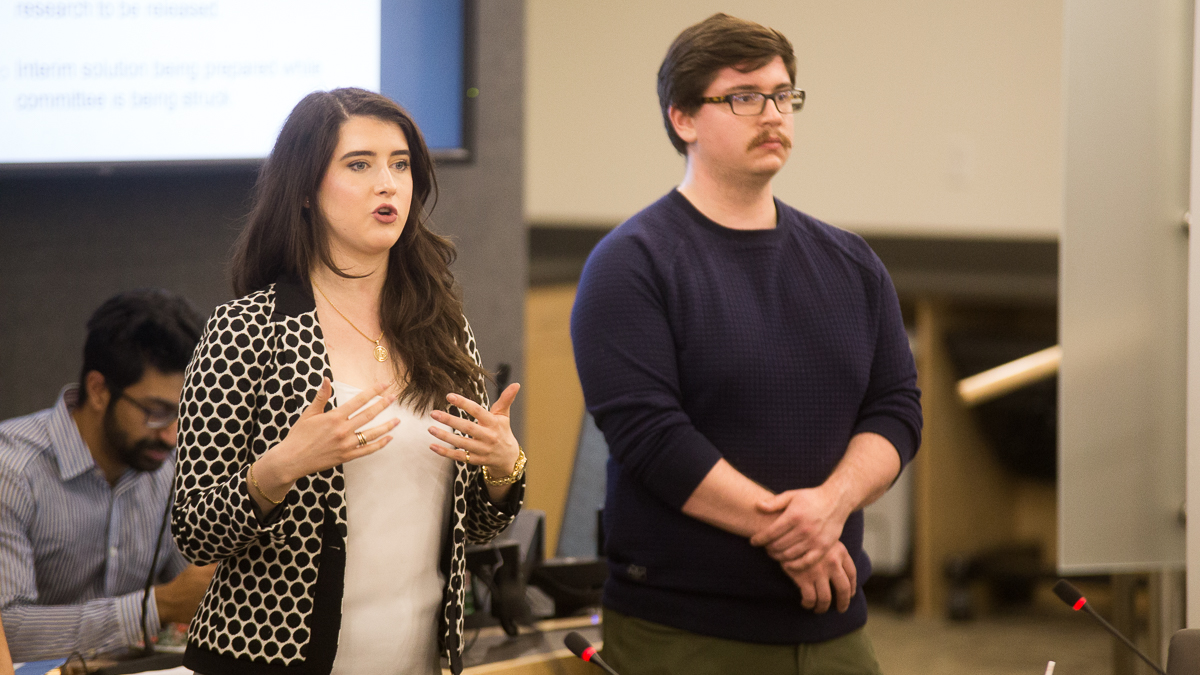Arts student fee grilled in council, but will go to referendum
 Rosty Soroka
Rosty SorokaDespite concerns from Students’ Union president Marina Banister and other student councillors, the proposed Organization for Arts Students and Interdisciplinary Studies (OASIS) fee will go to a referendum later this year.
On January 23, Students’ Council debated the opt-outable $2.50 per semester faculty association membership fee (FAMF) proposed by OASIS and whether if it was sound enough to go to a referendum. Concerns about the proposal centred on the organization’s inability to consult with a significant number of arts students about the fee, and questioned the relevancy the organization has with the student body. Despite these concerns, the proposal passed with 14 in favor and 10 opposed.
The vote in council followed a town hall organized by OASIS on January 17 that was meant to discuss the proposed fee with the student population. During the event, representatives from OASIS said they needed the revenue generated by the proposed fee to boost their granting capabilities to student groups. Excluding members of The Gateway, OASIS, and Students’ Council, only 10 students attended the town hall.
During debate, Students’ Union president Marina Banister and three other councillors were vocal about their apprehensions towards the fee proposal.
“Giving this a lot of consideration, I will be voting against this proposal because I do believe there’s been a lack of consultation as well as a lack of financial oversight of OASIS,” Banister said.
The overrepresentation of political science students in OASIS, and the organization’s relevance to the 5,414 arts students they represent, was brought up by Banister and Arts councillor Tina Liu.
“I do perceive there to be a lack of relevance of OASIS to current arts students right now,” Banister said. “The point of OASIS is to engage with all arts students, not just a specific subset.”
Banister said OASIS could’ve sent an email out through the faculty in order to better consult with students about their proposal.
“As an arts student, I received no such correspondence,” she said.
In council, OASIS president Ben Angus — who was present as he was proxying for another arts councillor — was on hand to answer criticisms. While he acknowledged that student consultation is “something we can still improve on,” he compared the low turnout at the OASIS town hall to GovWeek, a Students’ Union event started by Banister last year that was also criticized for having low attendance.
“I know we only had ten students attend… but if the SU can have a turnout of 60 students out a 20,000 student body during GovWeek and label it a success, then I’m comfortable with calling the town hall a relative success based off these SU standards,” he said.
Angus also said that the fee will be up for renewal after two years, instead of the usual four to five-year duration of most other fees, which will help hold OASIS accountable to students.
Other councillors spoke in favor of the fee, pointing out that students will have the option to opt out. Law councillor Sandy Brophy said the fee is something for arts students to decide once it goes to a referendum.
“FAMFs are an internal matter for the people of that faculty,” he said. “I think we should leave it to the students in arts to make that decision.”
Council will vote on the proposal again to approve the final wording of the referendum question, after which arts students will vote on the fee’s creation during the election season in March.
Three more fee proposals approved for referendum, one voted down
The arts fee proposal wasn’t the only one to be approved by council during that meeting. The proposal put forth by the Education Student’s Association to create an $8 opt-outable fee also passed, and council will approve the final referendum question at their next meeting.
Council also approved the referendum questions for the Engineering Students’ Society’s fee to increase from $7 per semester to $20. And the Student Events Initiative’s dedicated fee unit of $16.50 a semester. Students will also vote on these proposals in March.
While the other fee proposals will be heading to a referendum, council voted down the proposal put forth by the L’Association des Universitaires de la Faculté Saint-Jean (AUFSJ) with only three councillors in favor and 22 opposed. Faculte Saint-Jean councillor Delane Howie said the proposal “did not have the full will of the students” behind it.
“It might be a great idea for a future year but it felt a little bit rushed and more due diligence is in order,” she said.
The next meeting of Students’ Council will be on February 6 at Campus St. Jean.




